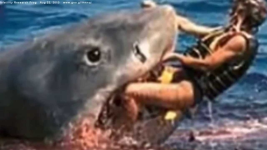I have many friends who are pet lovers and in particular several who are cat lovers. Cats are interesting animals in that they have had less proximity to humans over evolutionary time than dogs have, and thus retain many of their traits of independence---a fact which many cat "owners" will acknowledge: you don't choose the cat, the cat chooses you. Some cats even have multiple owners in multiple homes.
I've always mused, when considering people who keep "larger cats", that "if the cat is bigger than you, it will eat you" in observance of the many accidents that befall owners of cats of much larger size and on whose benevolence owners ultimately rely for their lives.
It turns out that even pets of a smaller size won't waste time eating their owners, given the chance (link).
"Previous studies have revealed some differences between canine and feline scavenging. Dogs tend to eat the face and throats of humans, then break the ribs and chew on bones. Cats, on the other hand, often strip skin from the nose, upper lip, and fingers (the same places, Rando notes, that they nip at when playing with a living owner). Scavenging is more common with dogs than cats, Byard adds, “but I don’t trust either of them.”
If you have a strong stomach for that sort of thing, the forensic article has photographs of the damage done when a houseful of hungry cats goes to work on their deceased owner. [LINK] (The article is paywalled, but I made it available here until February)
So love, and an emergency food supply, all in one ... "hooman"
I've always mused, when considering people who keep "larger cats", that "if the cat is bigger than you, it will eat you" in observance of the many accidents that befall owners of cats of much larger size and on whose benevolence owners ultimately rely for their lives.
It turns out that even pets of a smaller size won't waste time eating their owners, given the chance (link).
Yes, your pet might eat your corpse. That’s a problem for investigators. New study aims to help police, forensic pathologists, and others determine whether cats and dogs have interfered with crime scenes.
"Australian police probably expected a gruesome scene when they checked on a 69-year-old man suspected to have been dead for days. But when they opened the door to his home, they didn’t expect the approximately 30 cats that came flooding out. Inside, they found the man’s body on the floor, with his face gnawed down to the skull and his heart and lungs gone. As if to dispel any doubt about what happened, one cat was still sitting inside the man’s emptied chest cavity.""Previous studies have revealed some differences between canine and feline scavenging. Dogs tend to eat the face and throats of humans, then break the ribs and chew on bones. Cats, on the other hand, often strip skin from the nose, upper lip, and fingers (the same places, Rando notes, that they nip at when playing with a living owner). Scavenging is more common with dogs than cats, Byard adds, “but I don’t trust either of them.”
If you have a strong stomach for that sort of thing, the forensic article has photographs of the damage done when a houseful of hungry cats goes to work on their deceased owner. [LINK] (The article is paywalled, but I made it available here until February)
So love, and an emergency food supply, all in one ... "hooman"










